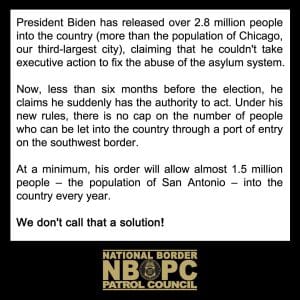Bill Brooks, southwest border field branch chief for Customs and Border Protection in Washington, D.C. stated, “We are refining the way we operate by managing risk.” According to an article appearing on the KRGV.com website on October 21, 2011, Brooks explained how agents will only be at commercial transportation hubs if intelligence justifies the operations.
Stated plainly, Border Patrol managers are increasing the layers of bureaucracy and making it as difficult as possible for Border Patrol agents to conduct their core duties. The only risks being managed by this move are too many apprehensions, negative media attention and complaints generated by immigrant rights groups.
Interior patrol operations, farm and ranch checks, and other enforcement operations met a similar fate nearly ten years ago when the Border Patrol implemented the same intelligence-based philosophy. Due to the unnecessary bureaucratic red tape, it is next to impossible to get an operation in those areas approved; therefore, apprehensions in those areas also decreased. By decreasing apprehensions, Border Patrol management and the Administration can make false claims regarding the security of our borders. Further, the lack of apprehensions makes it easier for the Administration to promote some form of amnesty.
Border Patrol agents have been extremely effective in arresting illegal immigrants, drug smugglers, and those violating a myriad of laws by conducting transportation checks. Millions of illegal aliens are currently residing in the United States and they are utilizing transportation systems to travel throughout the country. This change in policy would give criminals a free pass to exploit these transit systems. A decade ago nineteen illegal aliens overstayed visas and showed the vulnerability of our transportation system, which resulted in nearly 3,000 Americans losing their lives. This lesson must be lost on those running the Border Patrol in Washington.


